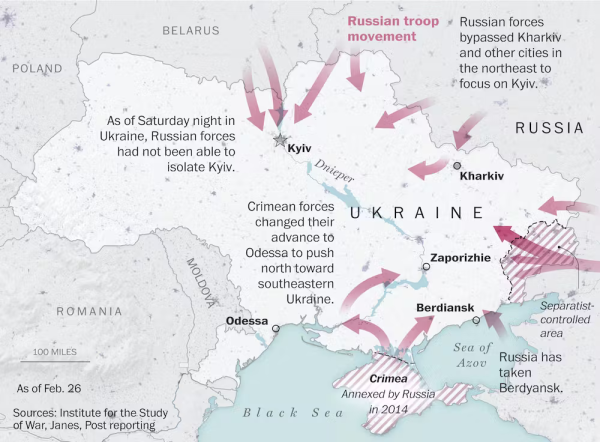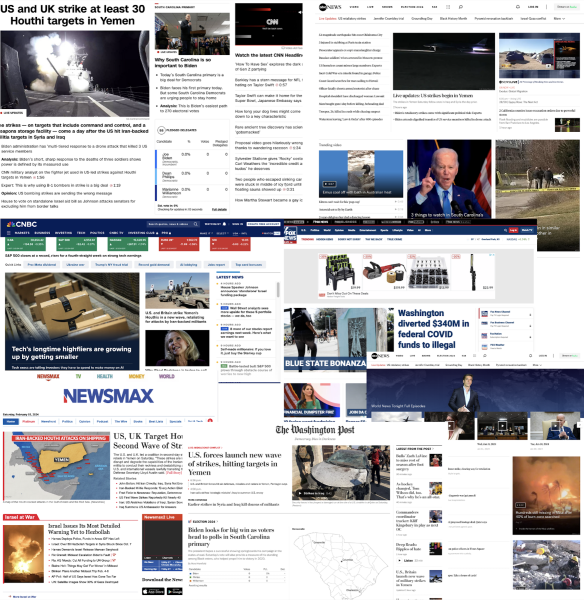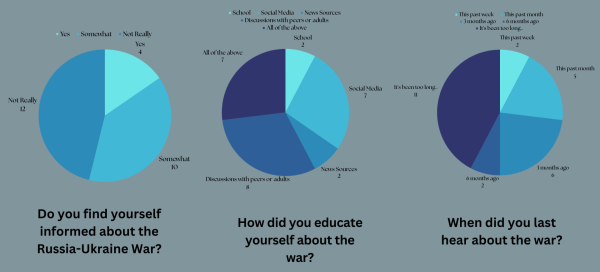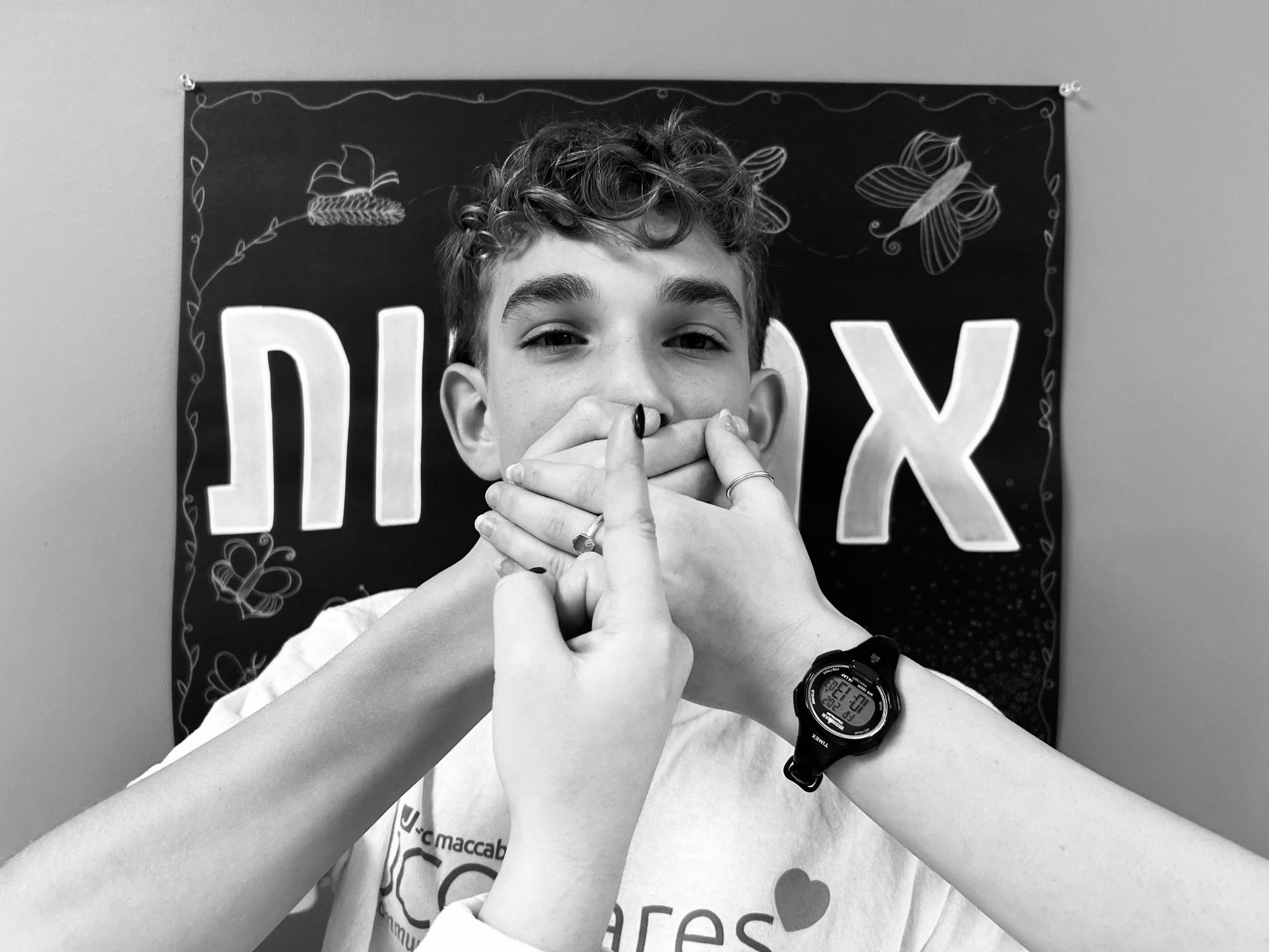Since the start of the war two years ago this month, the brutal Russia – Ukraine conflict has received increasingly less media attention. In 2021, it used to be the topic of every debate, discussion, and news broadcast. Now? Media attention has drastically diminished. Mainstream news outlets (FOX, CNN, ABC) have limited their coverage on the issue. The war has reached a standstill in the media. How important is it to stay knowledgeable about the situation?
Russia and Ukraine have had ongoing territorial disputes between one another, however it peaked in 2014 during the annexation of Crimea by Russia. This later led to the Russian-Ukraine war in 2021 which unfolded against long-standing geopolitical and historical power struggles. The conflict escalated when Russia, led by President Vladimir Putin, sent military forces to the border of Ukraine in February 2021. The war in 2021 was characterized by intense fighting between Ukrainian government forces and Russian separatists in the Donbas region (map below).

Ukraine received both political and economic support from several nations. The United States and European Union provided financial aid, military assistance, and diplomatic support for Ukraine. NATO countries expressed solidarity with Ukraine and took measures, including tough economic sanctions, to deter further aggression from Russia.
In 2021 to early 2022, it seemed as if the war was the most discussed situation in the world. News stations would constantly update the audience with new information, or simply give their opinion on the situation, yet in recent months, mainstream coverage of this conflict has died down or been discontinued.
How did such a historically significant war stop getting media coverage? It is a game of popularity. According to CNN, “After the attacks [against Israel], CNN [reporting on the Russia Ukraine war] —the cable news network that provided the most Ukraine coverage — fell to under one percent.”
According to Dr. Jacob Stoil, Chair of Applied History at the Modern War Institute in the U.S. Military Academy at West Point, trustee of the U.S. Commission on Military History, and a founding member of the International Working Group on Subtraining Warfare, the reason for the declining media coverage is because it is, “no longer a new story.” The majority of people lose interest in a topic after it is constantly being reported on. The importance remains the same, however the desire to keep updated reduces drastically as time goes on.
Currently, CNBC, NPR, and The Guardian continue to feed updates to their news outlets. Dr. Stoil said the following accounts on X (Twitter) are reliable sources to get updated news on the war: @SpencerGuard, @TheStudyofWar, and @sentdefender.
Unfortunately, with more timely content for American readers (Hamas’ attacks on Israel and U.S. Presidential elections), the articles on Ukraine aren’t getting the spotlight that other serious situations are receiving. These new topics in the media are overshadowing the voice of the Ukrainian people who are also in need of acknowledgement and safety.

When asked about what political strategy is involved in media coverage of the Ukraine war, Dr. Stoil replied, “We [general American population] can ask, how many Americans are going to, when they go to the ballot boxes in November, vote for a candidate based on their status in Ukraine? And it’s not going to be a significant percentage who vote solely on that information.” While there are vast groups of Americans who vote without regard to the opinions of the candidates and their foreign policies, there are still, “Americans, [who]… continuing to support Ukraine,” said Dr. Stoil.
There are numerous factors that go into the decisions made by Congress and presidential candidates regarding whether or not they would like to continue supporting and funding Ukraine. Economic status is an important aspect, and funding other countries is definitely taken into consideration by the politicians whether it is beneficial for the US.
According to CNBC, the war is still as active and lively as it was in 2021. They predict the war will continue for a while, however funding support from U.S. Congress is stalling, and domestic politics are determining whether the U.S. will continue to support Ukraine financially or not. Without a flowing supply of weapons and military assistance, Ukraine is now quickly losing ground as well as their ability to continue their resistance against Russian aggression.
In a recent survey of HBHA middle and upper school students, data suggests the majority of the surveyed students were not fully informed about the current situation, even the overall general facts. However, 20 out of 26 respondents were able to identify Volodymyr Zelenskyy, President of Ukraine, through an image. The students received their information from peers, parents, school, and social media, but only a few (2 out of 26) kept up with the war through news outlets. Over half the students answered that they have not heard an update on the Ukraine war for over 6 months.

Hopefully, the media and news will start to focus and prioritize the war as well to inform others of the current crisis. Despite less media, the war has not ended.
Every war and war-like situation within our world should be addressed. Our society should be informed about relationships and occuring disputes between countries. Staying informed about dangerous situations, like the Russia and Ukraine war, can potentially prevent similar occurrences in the future and support the victims in the ongoing war.
Standard disclaimer language: The views, and opinions, expressed by Dr. Stoil are his own and do not necessarily represent the views of the U.S. Government, Department of Defense, U.S. Army, U.S. Army Command and General Staff College, School of Advanced Military Studies or any other government agency. (References to this article should include the foregoing statement.)


















